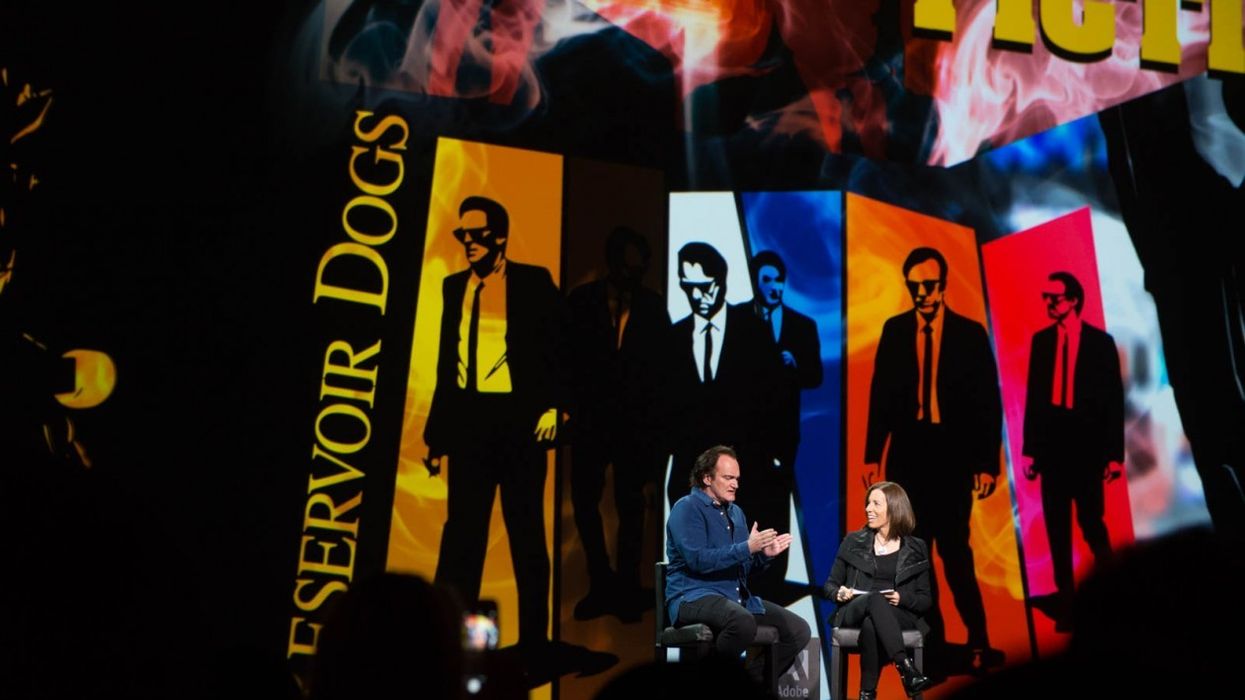3 Things You Can Learn from Quentin Tarantino's Talk at Adobe Max
At Adobe Max, Quentin Tarantino discussed everything from his impending retirement, to watching movies on iPhones.

During a discussion at Adobe Max with Adobe CMO Ann Lewnes, director Quentin Tarantino confirmed that he plans to retire from directing after making ten films (he's currently on number eight), saying he plans to go out with a "mic drop," though really, would you expect anything less from the one time enfant terrible? He covered a lot of other ground in the half-hour discussion, and here are three of the most interesting and surprising things that the The Hateful Eight helmer had to say about his career, technology, and the state of the industry.
He Went to Film School (Kinda)
Tarantino famously burst on to the scene as the writer of screenplays like True Romance and an early draft of Oliver Stone's Natural Born Killers, but some people don't know that the famously unschooled director actually applied to AFI, but got "turned down." According to Tarantino, "What happened was I borrowed a 16mm camera from a guy," and started to make a film, one which he originally intended to be a short, but after being inspired by Jim Jarmusch's landmark 80s indie Stranger Than Paradise decided to spent about three years working on his planned feature, My Best Friend's Birthday.
Though the 70-minute, $3,000 comedy's final reel ended up being destroyed in a lab fire (truncating it to 36 minutes), and while admitting that he didn't really know what he was doing, Tarantino says that it was on this film that he "learned how to make a movie," and that this education was a lot cheaper than a university.
He Doesn't Think "Every Movie Needs to Be Made"
Most people know that Tarantino loves movies, but, responding to a question about the ubiquity of technology and the unprecedented access it has granted in today's film industry, Tarantino gave an interesting answer. While acknowledging that technology has made filmmaking a "democratic process that it never was before," he also said rather bluntly that, "Not every movie needs to be made. Not every movie should be made, all right—I'm talking about one of the guys who made one of those movies that did not need to be made."
Tarantino continued: "It [My Best Friend's Birthday] needed to be made to teach me how to make a movie, but no one ever really needs to see that, but it did its job for me—I think it puts even more responsibility on the young filmmaker to work hard to achieve a level of craft because now craftlessness is almost being, if not encouraged, accepted," because the lack of the need for a DP and crew have led, in his mind, some young filmmakers to embrace the idea that "there still is a visual component to it—and I don't even know how important that is to young filmmakers, the visual aspect of the movie."
"I think [technology] puts even more responsibility on the young filmmaker to work hard to achieve a level of craft."
He's Not a Huge Fan of iPhones
Today, along with increased ease of production, people can watch movies and consume content pretty much anywhere they want. Asking for a show of hands as to how many people had watched a movie on their cell phone, he remarked that even though the number of people wasn't as big as he'd feared, "there's not, you know, 12-year-olds here." Tarantino then related how "growing up in Los Angeles in the 70s, we had to exist with the 3:30 movie on Channel Seven—where they would cut the crap out of it so it's completely unrecognizable with tons of commercials. You know, they actually once fit Lawrence of Arabia into a 90-minute slot, so I guess watching it on an iPhone is better."
What's ironic in all this is that in much the same way that technology changed filmmaking, so did Tarantino When Pulp Fiction became the first independent film to earn $100 million at the box office. He not only inspired a generation of filmmakers, but also convinced Hollywood that indie films were cool and profitable, and for a second, guys like Troy Duffy were turning into overnight rock stars.
That age ended fast, but the myth lived on, and now the proliferation of not just production resources, but distribution platforms, has put Tarantino in a world he helped create, but doesn't necessarily understand. Time will tell if he really does go into retirement with a "mic drop" in two films time, or if he'll find himself behind the camera for decades to come (I, for one, can't really see him doing much else). And no matter if you agree with him or not, he's definitely one of the most vital and honest voices in Hollywood. Overnight success is a dangerous thing, but instead of turning into a hack, Tarantino has used the carte blanche he earned 22 years ago to say whatever is on his mind, and damn the torpedoes. Which, in Hollywood, indie or otherwise, is pretty refreshing.











